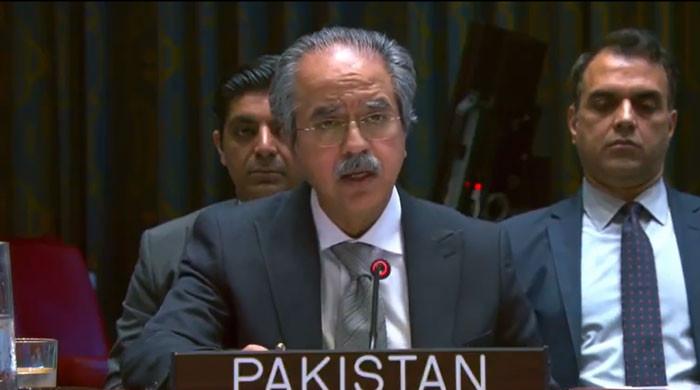- Impassador Iphtikhar highlights the online dimension of the terrorist threat.
- TTP largest terrorist group in Afghanistan with 60,000 combatants: send
- Pakistan paid a high price in frustrated terrorist attacks, says Iftikhar.
Pakistan has told the UN Security Council that Afghanistan’s terrorism remains the threat more severely for its national security, urging the problem to be addressed as a priority for regional peace.
Speaking at the Council Briefing on Afghanistan, Pakistan’s permanent representative to the un, Ambtikhar Ahmad, Said that multiple terrorist entisies, including daesh-k, al-Qaeda, Tehreek-e-Taliban Pakistan (TTP), EAST TURKESTAN ISLAMIC (Etim), Balochistan Liberation Army (Bla) and the Majeed Brigade – Continue to operate from Afghan sanctuaries.
He said that more than 60 terrorist camps function as centers for cross -border infiltration and attacks, and added that Pakistan has “credible evidence” of collaboration between these groups through joint training, trade of illicit weapons, refuge for militants and coordinated assaults aimed at civilians, security forces and development projects in Pakistan.
The Iftikhar ambassador highlighted the online dimension of the threat, saying that these groups were using almost 70 stalled propaganda accounts for Afghan IP addresses and had to be stopped with the cooperation of social media platforms.
The envoy said that Pakistan and China had jointly requested the UN sanctions committee 1267 to list the Bla and Majeed brigade and express hope for rapid action on the proposal.
He described the TTP, with an estimated 6,000 combatants, such as the largest terrorist group on Afghan soil and said that Pakistan had frustrated several infiltration attempts, confiscating the sophisticated military degrees left by foreign forces during his retreat from Afghanistan.
He said that these operations had reached a great cost, noting that 12 Pakistani soldiers were martyred this month while defending the borders.
The Iftikhar ambassador also caught attention to the economic and humanitarian crisis of Afghanistan, noting that the UN humanitarian needs and humanitarian response had received only 27% of its required funds.
He said that Pakistan had received millions of Afghan refugees for more than four decades, often with inadequate international assistance, and asked for a fairer exchange of the load.
Although he acknowledged that the civil war in Afghanistan had ended for the first time in 40 years, the ambassador said that the situation remained “deeply worrying” and emphasized that the sustained commitment, instead of isolation, was the only way to achieve peace.




